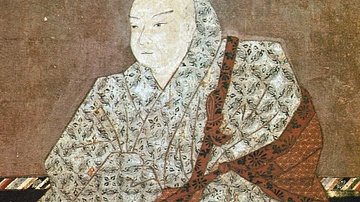Search
Search Results

Article
The Wars of the Roses: Consequences & Effects
The Wars of the Roses (1455-1487 CE) was a dynastic conflict where the nobility and monarchs of England intermittently battled for supremacy over a period of four decades. Besides the obvious consequences of Lancastrian and Yorkist kings...

Article
Insei: Cloistered Government in Ancient Japan
Insei or 'cloistered government' describes the strategy of emperors during the late Heian Period (794-1185 CE) in ancient Japan where they abdicated in favour of a chosen heir yet still ruled in some capacity, typically after retiring to...

Article
The Economy of Ptolemaic Egypt
Ptolemaic Egypt rapidly established itself as an economic powerhouse of the ancient world at the end of the 4th century BCE. The wealth of Egypt was owed in large part to the unrivalled fertility of the Nile, which served as the breadbasket...

Article
Roman Women in Business
Roman women faced legal, ideological, and cultural limitations in several areas of their lives; deep-rooted traditions regarding the role of women in the Roman world resulted in pre-conceived views which saw women characterised by weakness...

Image
Opening Session of the General Assembly, 5 May 1789
Painting depicting the opening session of the Estates-General of 1789. By Auguste Couder, 1839.
Museum of the History of France, Versailles.

Image
Maximilien Robespierre as a Deputy of the Third Estate
Maximilien Robespierre dressed in the all-black attire of a deputy of the Third Estate, during the Estates-General of 1789 and the National Constituent Assembly. Oil on canvas portrait by Pierre-Roch Vigneron, after a pastel drawing by Adélaïde...

Definition
Ancient Japan
Ancient Japan has made unique contributions to world culture which include the Shinto religion and its architecture, distinctive art objects such as haniwa figurines, the oldest pottery vessels in the world, the largest wooden buildings anywhere...

Definition
English Reformation
The English Reformation began with Henry VIII of England (r. 1509-1547 CE) and continued in stages over the rest of the 16th century CE. The process witnessed the break away from the Catholic Church headed by the Pope in Rome. The Protestant...

Definition
Maximilien Robespierre
Maximilien François Marie Isidore de Robespierre (1758-1794) was a French lawyer who became one of the primary leaders of the French Revolution (1789-1799). From his initial rise to stardom in the Jacobin Club, Robespierre went on to dominate...

Definition
Storming of the Bastille
The Storming of the Bastille was a decisive moment in the early months of the French Revolution (1789-1799). On 14 July 1789, the Bastille, a fortress and political prison symbolizing the oppressiveness of France’s Ancien Régime was attacked...